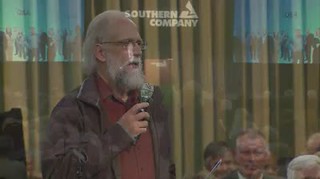 Dr. Noll remarked on the rain falling and said of the solar canopy:
Dr. Noll remarked on the rain falling and said of the solar canopy:
It’s multipurpose, it provides shade, it provides shelter, and it provides renewable energy, so that makes it really awesome.
 He offered as story about events and world population at those times:
He offered as story about events and world population at those times:
- 1 billion in 1783: the first hot air balloon in 1783 in Paris, France
- 2 billion in 1903: Orville and Wilbur Wright’s first flight
-
 1969: Apollo 11 landed on the moon when Dr. Noll was 8 years old
1969: Apollo 11 landed on the moon when Dr. Noll was 8 years old
- 1973: Oil crisis
- 4 billion in 1977: Jimmy Carter installed first solar panels on White House
- 1981: Ronald Reagan took down those solar panels
- 7 billion now: Accelerating climate change
 He said we’re entering a second solar age,
the first one being the fossilized solar power of fossil fuels.
He mentioned the solar powered long flights of the
Solar Impulse
airplane as an example of hope, and an example of accelerating change.
He said we’re entering a second solar age,
the first one being the fossilized solar power of fossil fuels.
He mentioned the solar powered long flights of the
Solar Impulse
airplane as an example of hope, and an example of accelerating change.
Then you know what we are capable of, what we can do.
He concluded: Continue reading














